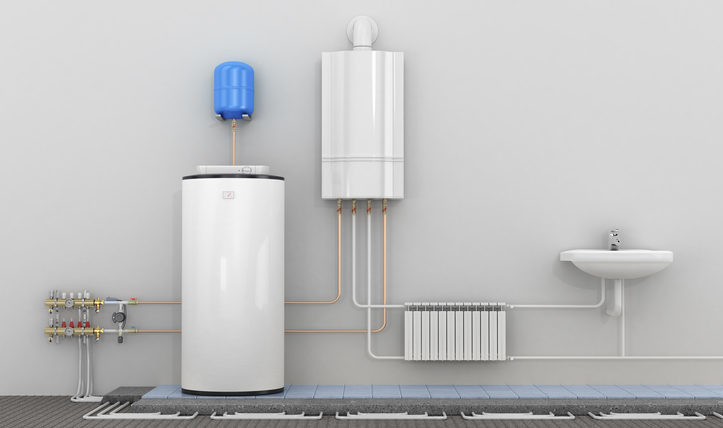Which Saves More Energy: Tank or Tankless Water Heaters
The water heater is a part of the home that never gets attention unless something is wrong. To be fair, there is a set and forget aspect to how water heaters operate. It’s a workhorse that’s running every day through every season delivering hot water to showers and sinks throughout the home.
When it takes longer for the water to warm up, or you can’t get it to warm up at all, it’s time for a new water heater. The first question you have to answer is whether you’re going to get a tank or tankless water heater. For most people energy efficiency is the biggest factor.
Tank vs Tankless Water Heaters
Usually, residential homes have storage tank water heaters, which normally hold 40-50 gallons of water. A pipeline inside the home is used to transport hot water to its intended location, such as the bathrooms, or other sink outlets.
What Is a Tankless Water Heater and How Does It Work?
Tankless water heaters (on-demand water heaters) utilize powerful burners to quickly heat water as it passes through the heating element and then deliver it to sinks or showers without the need for a container. Electricity or gas is the power source used to operate tankless water heaters.
In the last decade, tankless water heaters have been in demand because of the claim that they use far less energy than a storage tank water heater. But are they that much more energy efficient? And does the operational cost offset the higher upfront expense?
Let’s find out!
The Verdict: Tankless Water Heaters Are More Efficient
According to the Environmental Protection Agency (EPA) tankless water heaters use less energy. How much less energy a tankless water heater will consume depends on how much hot water you use daily.
The EPA estimates that a tankless water heater uses up to 34% less energy than a storage tank water heater if you use 41 gallons or less of hot water daily. If the household uses closer to 86 gallons of hot water a day a tankless water heater will be up to 14% more efficient.
Research from Consumer Reports found that tankless water heaters were 22% more efficient than gas-powered tank water heaters. The distinction is important because gas-powered tank water heaters are much more efficient than electric tank water heaters.
There is one exception though. Gas-powered tankless water heaters that have a continuously burning pilot light can waste energy and cancel out the energy savings. The better option is to get a tankless water heater with an intermittent ignition device (IID) that’s switched on as needed.
Cost of Gas-Powered Tankless Water Heaters
Installing a natural gas or propane tankless water heater will cost anywhere from $1,000 to $2,000. If you live close to a natural gas line connecting your preexisting pipes will be somewhat simple. However, if you don’t have access to natural gas, you’ll have to acquire natural gas on your own.
Cost of Electric-Powered Tankless Water Heaters
A gas tankless water heater is marginally more affordable than an electric tankless water heater. Installing an electric water heater typically costs anywhere from $1,000 and $1,500. Installation of electric tankless water heaters is a bit easier compared to gas-powered tankless water heaters.
Homeowners that are really serious about maximizing energy savings may want to consider getting more than one tankless water heater. Installing one at each hot water point can reduce energy use by as much as 50%.
The tradeoff is the upfront costs. Tankless water heaters tend to cost significantly more than standard tank water heaters. The installation is also expensive whether you are installing a tankless water heater in a new home or replacing an existing tank water heater.
In order to know how much a tankless water heater will reduce your energy bill, you would need to factor in your own personal rates. That said, the Department of Energy estimates that a gas-powered tankless water heater would lower energy costs by around $100 a year, and an electric tankless water heater reduces costs by $44 a year.
Overall, tankless heaters are substantially more costly than their tank-based counterparts.
Why Are Tankless Water Heaters More Efficient?
Tankless water heaters, also known as demand-type or on-demand water heaters, don’t store and reheat water like a conventional storage tank water heater. Instead, a tankless water heater only heats up water when it’s needed.
Benefits of tankless water heaters
The lifespan of a tankless water heater is 20 to 30 years, which is twice as long as that of a storage tank water heater.
With a tankless water heater, when the hot water is turned on that’s when the equipment gets to work. A high-powered burner quickly heats up water as it passes through the heat exchanger before sending it directly where it’s needed. Unlike a tank water heater, the hot water isn’t stored for use at a later date and can be reheated multiple times.
No Standby Heat Loss
One of the biggest differences between tank and tankless water heaters is that tank water heaters lose a lot of heat. There is usually 30-50 gallons of water in the tank that’s warmed for whenever it’s needed. This setup causes significant standby heat loss that isn’t a problem with most tankless water heaters.
The problem can be minimized with proper insulation all around the tank water heater, keeping the temperature set low, and putting the water heater in an area that’s warmer. Tank water heaters that are in a cold garage or basement during the winter have to work harder to warm the water, which requires more energy.
Whether you have a gas-powered or electric water heater Major Energy can supply the energy you need. We’re a reliable energy provider throughout the Northeast and Midwest. Use your zip code to see which gas and electricity plans are available in your area.
